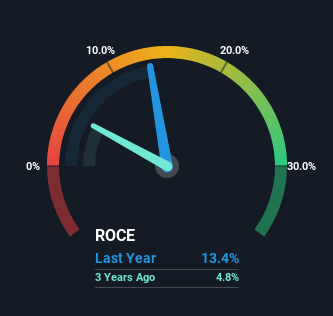- Saudi Arabia
- /
- Basic Materials
- /
- SASE:3092
Be Wary Of Riyadh Cement (TADAWUL:9512) And Its Returns On Capital
Ignoring the stock price of a company, what are the underlying trends that tell us a business is past the growth phase? More often than not, we'll see a declining return on capital employed (ROCE) and a declining amount of capital employed. This reveals that the company isn't compounding shareholder wealth because returns are falling and its net asset base is shrinking. Having said that, after a brief look, Riyadh Cement (TADAWUL:9512) we aren't filled with optimism, but let's investigate further.
What is Return On Capital Employed (ROCE)?
Just to clarify if you're unsure, ROCE is a metric for evaluating how much pre-tax income (in percentage terms) a company earns on the capital invested in its business. To calculate this metric for Riyadh Cement, this is the formula:
Return on Capital Employed = Earnings Before Interest and Tax (EBIT) ÷ (Total Assets - Current Liabilities)
0.13 = ر.س229m ÷ (ر.س1.9b - ر.س182m) (Based on the trailing twelve months to December 2021).
Therefore, Riyadh Cement has an ROCE of 13%. On its own, that's a standard return, however it's much better than the 6.5% generated by the Basic Materials industry.
View our latest analysis for Riyadh Cement

Above you can see how the current ROCE for Riyadh Cement compares to its prior returns on capital, but there's only so much you can tell from the past. If you'd like, you can check out the forecasts from the analysts covering Riyadh Cement here for free.
How Are Returns Trending?
There is reason to be cautious about Riyadh Cement, given the returns are trending downwards. Unfortunately the returns on capital have diminished from the 18% that they were earning five years ago. And on the capital employed front, the business is utilizing roughly the same amount of capital as it was back then. Since returns are falling and the business has the same amount of assets employed, this can suggest it's a mature business that hasn't had much growth in the last five years. So because these trends aren't typically conducive to creating a multi-bagger, we wouldn't hold our breath on Riyadh Cement becoming one if things continue as they have.
On a side note, Riyadh Cement has done well to pay down its current liabilities to 9.6% of total assets. That could partly explain why the ROCE has dropped. Effectively this means their suppliers or short-term creditors are funding less of the business, which reduces some elements of risk. Some would claim this reduces the business' efficiency at generating ROCE since it is now funding more of the operations with its own money.
The Bottom Line On Riyadh Cement's ROCE
In the end, the trend of lower returns on the same amount of capital isn't typically an indication that we're looking at a growth stock. And long term shareholders have watched their investments stay flat over the last year. Unless there is a shift to a more positive trajectory in these metrics, we would look elsewhere.
One more thing, we've spotted 1 warning sign facing Riyadh Cement that you might find interesting.
While Riyadh Cement isn't earning the highest return, check out this free list of companies that are earning high returns on equity with solid balance sheets.
New: AI Stock Screener & Alerts
Our new AI Stock Screener scans the market every day to uncover opportunities.
• Dividend Powerhouses (3%+ Yield)
• Undervalued Small Caps with Insider Buying
• High growth Tech and AI Companies
Or build your own from over 50 metrics.
Have feedback on this article? Concerned about the content? Get in touch with us directly. Alternatively, email editorial-team (at) simplywallst.com.
This article by Simply Wall St is general in nature. We provide commentary based on historical data and analyst forecasts only using an unbiased methodology and our articles are not intended to be financial advice. It does not constitute a recommendation to buy or sell any stock, and does not take account of your objectives, or your financial situation. We aim to bring you long-term focused analysis driven by fundamental data. Note that our analysis may not factor in the latest price-sensitive company announcements or qualitative material. Simply Wall St has no position in any stocks mentioned.
About SASE:3092
Riyadh Cement
Produces and sells cement in the Kingdom of Saudi Arabia, the Kingdom of Bahrain, the State of Iraq, State of Yemen, the Hashemite Kingdom of Jordan, and the Sultanate of Oman.
Flawless balance sheet and undervalued.
Market Insights
Community Narratives




